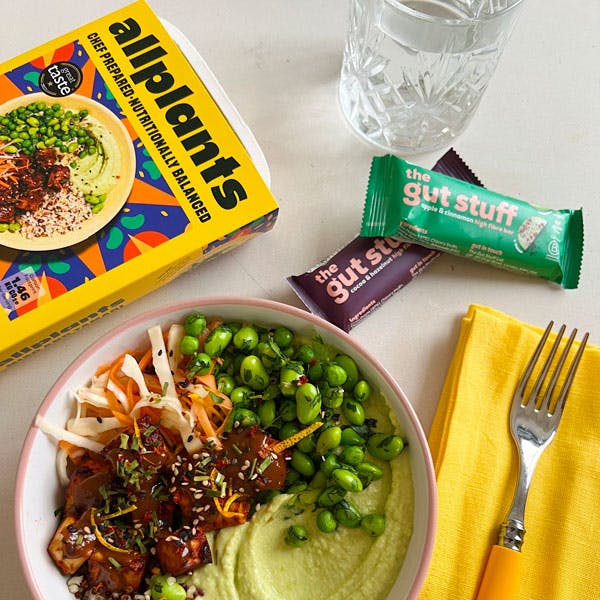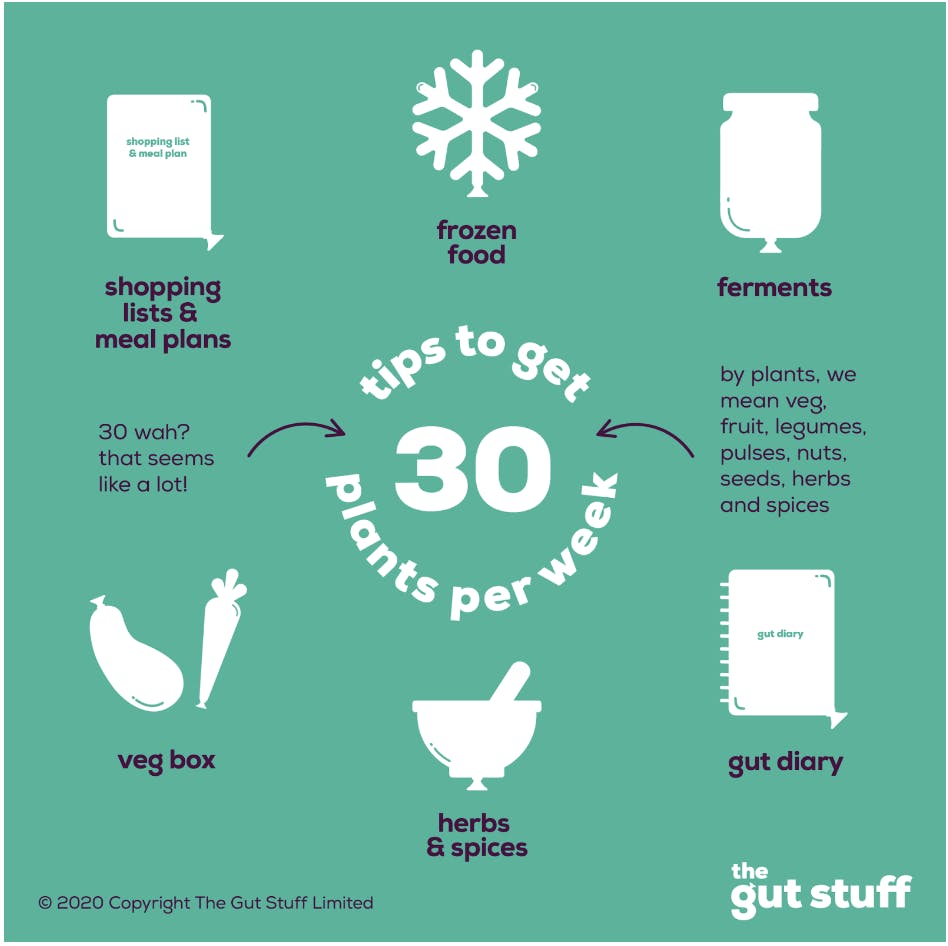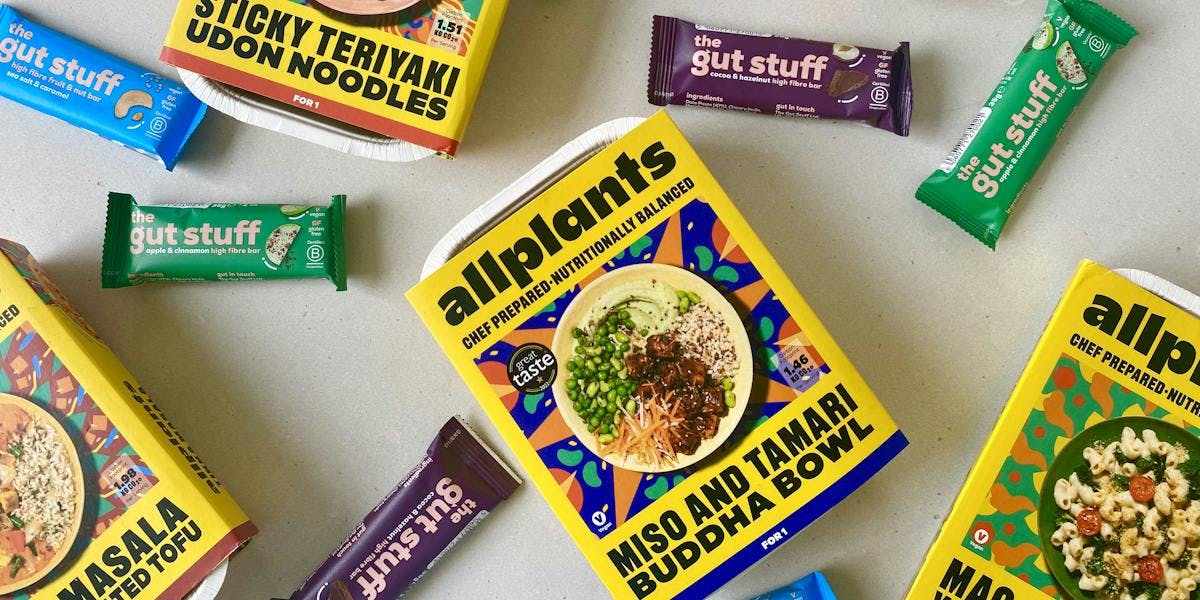Lifestyle
The importance of plant based variety and gut health
6min read
How a varied diet of plant based food can increase good health and vitality
WHAT IS THE GUT, WHY IS IT IMPORTANT?
We tend to think of our gut as just our stomach, but it’s really everything from our mouth all the way down to our bottom. And yes, you are right in thinking it’s responsible for digestion and absorption of your food, but, it also does so much more. As well as being closely interlinked with our immune system, it’s also in constant communication with our brain and very importantly it houses your microbiome.
So what is the gut microbiome? Put simply, it is a term used to describe all the microbes that live in your gut - we’ve got trillions of them, and they affect pretty much everything, from our ability to produce vitamins like vitamin `B and K, to regulating our metabolism, fermenting fibre, and supporting our immune system. (15) So very important!
Although microbes start to populate our gut from birth (potentially even prior), they’re not there forever, in fact they come and go over time. Much like in a tropical rainforest, our microbiome houses lots of different species all living and working together in harmony. As in a rainforest, to thrive, you need lots of different species of microbes in your gut. We know from the research having a more diverse mix of microbes is beneficial to health (5). All of the different species of microbes do different things and play different roles and therefore you need a variety. Something we’ll go into further down…
HOW DOES GUT HEALTH IMPACT OVERALL HEALTH?
As mentioned, the role of the gut is extensive, from digesting and absorbing food, including fibre, producing vitamins, fighting disease (14) and possibly even impacting our moods!
How can our gut microbes do all of this? Great question. Our gut bacteria produce substances that are then absorbed into our blood system through our intestinal cells. They then go on to support various functions all around our bodies, including in our organs, nervous system and immune system - maintaining a balance between reacting to things that may cause harm and tolerating those that won’t, such as your ‘good’ bacteria. Your microbes can even impact how well we respond to dietary changes, including those linked to blood sugar control. (1)
Like in the tropical rainforest example mentioned above, our microbes depend on a delicate balance. When this balance is out of sorts (aka. dysbiosis) problems can arise. Research has found these to include chronic fatigue syndrome (2), inflammatory bowel disease (3), cancer (4), type 2 diabetes, obesity and cardiovascular disease (5).

HOW CAN YOU SUPPORT YOUR GUT HEALTH
Don’t worry it’s not all doom and gloom we promise. There are many lifestyle factors we can work on to improve our gut health; from getting more sleep (23, 24) and exercising regularly (25, 26), to what we eat ….
Over the years more and more research has suggested we may be able to modify our microbiome simply through what we eat (6,7,8,9). Whilst promising, due to the complexity of our diets amongst other factors, we were lacking large scale studies to tie any outcomes to specific foods (6).
However, exciting recent research has identified microbes that are strongly and consistently linked to dietary patterns (10). The research has identified ‘good’ and ‘bad’ gut bugs that correlate with ‘healthy’ (plant based foods, healthy fats, oily fish etc.) and ‘unhealthy’ foods (processed foods) and dietary patterns (10, 11,12,13). Furthermore the research found a wide variety of dietary fibre from plant based sources is key to support a healthy gut microbiome. (10)
The main takeaway here – dietary variety is key.
SO LET'S LOOK AT DIETARY VARIETY
What does this look like, firstly think of eating the rainbow, enjoying a wide mix of different coloured plant based foods. A wide variety of fruits and vegetables are high in fibre and polyphenols that our ‘good’ gut bugs love (16, 17).
Why? These compounds act like fuel for your gut bugs, As they are not easily absorbed they make their way through to your large intestine - the home of most of your gut bacteria. It’s here that your microbes feast on the polyphenols turning them into beneficial compounds.
Plant based foods extend much further than fruits and vegetables, like nuts and seeds. As well as being another great source of fibre and polyphenols, they contain healthy fats, including omega-3 fatty acids, which have been linked to a more diverse gut microbiome (18).
Next up legumes, think chickpeas, lentils etc. again a great source of dietary fibre, including prebiotic fibres that feed your ‘good’ gut bacteria (19, 20).
Not forgetting whole grains, another great source of fibre, they’re associated with a more diverse gut microbiome and lowering your risk of chronic conditions like heart disease - win win. (21, 22).
What does this look like overall? You may have heard of the magic 30? (read more here) We know it sounds like a lot, but with our tools and tricks it’s a lot more achievable than you may think.

STUCK WHERE TO START?
Or for the weeks you’re short on time, then one thing we love to do is stock up the freezer with our favourite allplants meals which are packed full of the fibre and variety we need to keep our gut bugs happy.

Written by: Annabel Sparrow | The Gut Stuff Nutritionist
Annabel is a Registered Associate Nutritionist with a personal and professional interest in gut health. With a BSc degree in Psychology and MSc in Nutrition and Behaviour, she is passionate about building healthy relationships with food and understanding the connection between food, mood and health. Annabel applies her psychological background in combination with her knowledge of nutrition to help people manage and improve their health without restriction.
REFERENCES
Let us take care of dinner
We help to make eating more plants easy and delicious. Fancy letting us take care of dinner? Check out our delicious meals here.
Shop now
